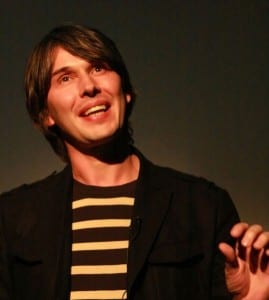Hacks and Headlines Part 2: A Press Huddle with Brian Cox
By Rupert P Cole, on 8 September 2012
I find it odd that with Sir Paul Nurse, I attended a press conference, but with Brian Cox a huddle. Why? 
I heard that one young woman at Professor Cox’s appearance in a festival highlights show let off a loud shriek of excitement. But were the hardened hacks expected to give a similar reception, nestling closely around Cox, clamouring to bathe in his celebrity aura?
Talk of auras reminds me that we were not just in the presence of a celebrity, but a celebrity physicist – a rare breed. There have been a few – Hawking, Feynman, Einstein, Faraday – but Brian Cox was the latest.
When the floor opened for questions, the dense press plasma fell into a nervous silence. Some beforehand had boasted about ignoring his science, and grilling Cox on his music career – allegedly he was only a bit-part keyboardist for D:Ream.
No such courage surfaced though. Cox, breaking the admiring hush, joked to the throngs of journalists, “you probably don’t have any questions…”
Life after Higgs?
Following a question about a plaque Cox was unveiling to George Paget Thomson – who was awarded the Nobel prize for discovering the wave-like properties of the electron here in Aberdeen, 1927 – one journalist began:
“obviously, the Higgs boson has been hugely successful, I don’t mean in physics, I mean…”
“In giving mass to everything in the universe?”, Cox interjected. (An appreciative roar of laughter.)
“In PR terms”, the journalist clarified. “I was sort of wondering what’s next? What should CERN do to promote itself?”
“From our point of view of covering it, so far as the public’s concerned, well it’s done it, it’s over, it’s finished, it’s found it.”
Particle physics has never before been in the news, Cox replied. CERN has been there since 1954, but “I think people first heard about it through Dan Brown novels.” Since the LHC has been talked about as recreating the conditions just after the big bang, it has captured the public’s imagination.
“CERN in principle, and almost in practice, doesn’t really care about being in the news.” Of course, the Higgs story has been inspirational for a new generation of scientists, but the international funding makes it collectively it “a cheap endeavour,” so the funding won’t stop.
The things which will excite particle physicists now, even more so than the Higgs discovery, probably won’t be headline material. Can you imagine breaking news like “we’ve discovered an anomaly in the way the Higgs particle couples with electrons”?
Science moves on in the news. Mars and Curiosity, “switches” in the junk DNA.. “We can’t sit here and say, only pay attention to CERN forget all this DNA stuff.”
So what, Lynx? The Brian Cox Effect!
Another question was offered: “On a less scientific note, you spoke recently about meeting Kate Moss…”
“Well I didn’t,” Cox corrected. “It’s interesting actually that story – I just bumped into her, about 2 years ago now in a London pub. I don’t know who I told.”
The Telegraph’s fashion column reported they met at a “fancy soirée” only last month. Kate, on behalf of her daughter, had inquired about some aspect of thermodynamics.
“Because I was wondering”, the journalist rejoined, “what you thought were the best and worst things… about being a celebrity?”
“I thought you were going to say about Kate Moss…” (More laughter).
Cox tells us any academic or scientist would always like attention. But the day to day process of wondering around when you have had a television program is quite complicated and difficult.
“You get stopped a lot, with pictures to be taken, so logistically it’s quite tricky, the logistics of shopping becomes difficult.” Though it’s good for meeting “interesting people.” Like Moss, perhaps.
In Professor Cox, we have a curious meeting of fame and science. Why has he become the press’ celebrity boffin, Kate Moss’ point of reference on scientific matters, and our culture’s correspondent for CERN and the universe at large? Does his floppy hair and Oldham twang help? Possibly.
Professor Cox is going back into university lecturing soon. I’m sure Manchester University will have a boom in undergraduate physics applications, and perhaps alter the male-dominated demographic in that Institution’s department.
Will the “Brian Cox effect” sustain itself? Perhaps it will grow exponentially, and we will see Cox invade other cultural terrains…
We can all look forward to Professor Brian presenting the coX-factor and Maths of the Day. Who will be able to resist the West End hit musical, Brian Cox Supersymmetry-star? And, coming to a 4D imax near Oldham, Brian Cox: a biopic, directed by Brian Cox, written by Brian Cox and starring Brian Cox. Don’t underestimate the Brian Cox Effect.
Rupert Cole is a History of Science, Technology and Medicine MSc student in UCL Science and Technology Studies.
One Response to “Hacks and Headlines Part 2: A Press Huddle with Brian Cox”
- 1
 Close
Close


Articulate, media friendly scientists that have sex appeal are few and far between. Everyone loves a geek with glamour. Brian Cox, we love you for exciting the next generation in a way that lab coated boffins fail to. Mr Rupert Cole , you next?